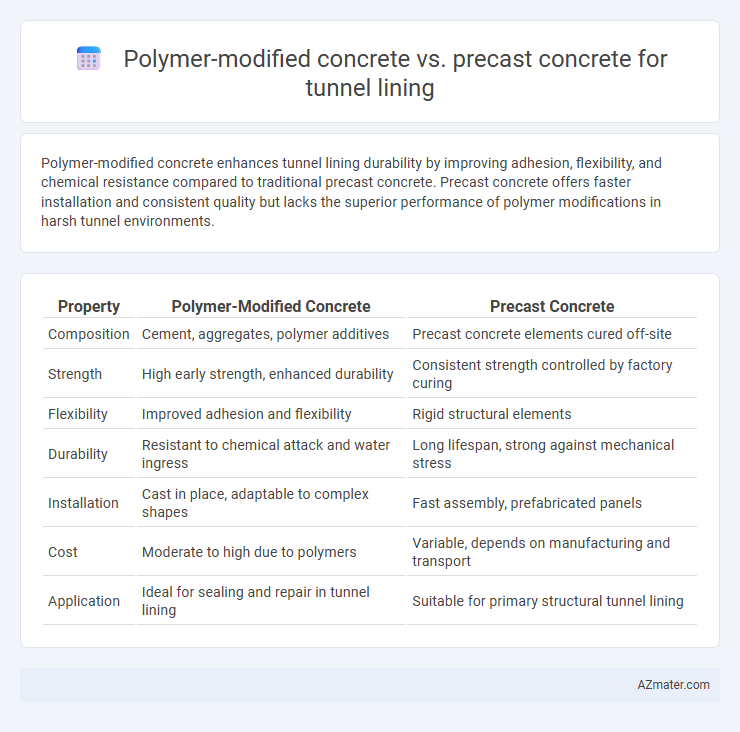Polymer-modified concrete enhances tunnel lining durability by improving adhesion, flexibility, and chemical resistance compared to traditional precast concrete. Precast concrete offers faster installation and consistent quality but lacks the superior performance of polymer modifications in harsh tunnel environments.
Table of Comparison
| Property | Polymer-Modified Concrete | Precast Concrete |
|---|---|---|
| Composition | Cement, aggregates, polymer additives | Precast concrete elements cured off-site |
| Strength | High early strength, enhanced durability | Consistent strength controlled by factory curing |
| Flexibility | Improved adhesion and flexibility | Rigid structural elements |
| Durability | Resistant to chemical attack and water ingress | Long lifespan, strong against mechanical stress |
| Installation | Cast in place, adaptable to complex shapes | Fast assembly, prefabricated panels |
| Cost | Moderate to high due to polymers | Variable, depends on manufacturing and transport |
| Application | Ideal for sealing and repair in tunnel lining | Suitable for primary structural tunnel lining |
Introduction to Tunnel Lining Materials
Polymer-modified concrete enhances traditional concrete by incorporating polymers, improving durability, adhesion, and chemical resistance critical for tunnel lining applications. Precast concrete offers controlled manufacturing conditions ensuring high quality and consistency, enabling faster installation and reduced onsite labor in tunnel construction. Both materials address essential tunnel lining challenges such as load-bearing capacity, waterproofing, and longevity under harsh underground environments.
Overview of Polymer-Modified Concrete
Polymer-modified concrete (PMC) enhances traditional concrete by incorporating polymers, which improve its adhesion, flexibility, and resistance to chemicals and water ingress, making it ideal for tunnel lining applications exposed to harsh environments. The inclusion of polymers such as styrene-butadiene rubber or epoxy resins increases tensile strength and durability, reducing maintenance needs and extending service life compared to standard concrete. PMC's superior impermeability and crack resistance are especially beneficial in tunnel linings, enabling better performance under dynamic loads and groundwater pressure.
Understanding Precast Concrete
Precast concrete for tunnel lining offers precise dimensional control and high quality due to factory fabrication under controlled conditions, reducing on-site construction time and improving consistency. It provides superior structural integrity and durability against tunnel environmental stresses such as groundwater pressure and chemical exposure. This method supports rapid installation, minimizes labor costs, and enhances safety compared to in-situ polymer-modified concrete, which relies heavily on curing conditions and on-site quality control.
Comparative Material Properties
Polymer-modified concrete exhibits enhanced flexibility, improved chemical resistance, and higher tensile strength compared to traditional precast concrete, making it ideal for tunnel linings exposed to aggressive environments. Precast concrete offers superior dimensional accuracy, faster installation due to factory-controlled conditions, and consistent compressive strength typically ranging from 30 to 50 MPa. The choice depends on balancing the polymer-modified concrete's durability and adaptability against the precast concrete's quality control and rapid deployment in tunnel construction.
Installation Processes: On-Site vs Precast
Polymer-modified concrete offers enhanced flexibility for tunnel lining with on-site installation, allowing for seamless adaptation to complex tunnel geometries and immediate curing properties that reduce downtime. Precast concrete tunnel linings, manufactured in controlled environments, ensure consistent quality and rapid segment assembly during installation, significantly accelerating construction schedules in repetitive tunnel sections. Site conditions and project timelines largely determine the choice, as polymer-modified concrete excels in customization and repairs, while precast concrete provides efficiency and uniformity in mass production scenarios.
Durability and Longevity
Polymer-modified concrete offers enhanced durability for tunnel lining through improved chemical resistance, reduced permeability, and increased flexibility, which helps prevent cracking under load and environmental stress. Precast concrete tunnel lining provides consistent quality and controlled curing conditions, resulting in uniform strength and lower susceptibility to on-site construction defects. While polymer-modified concrete excels in resisting aggressive environments for prolonged service life, precast concrete delivers reliable structural performance with ease of installation, making both options suitable depending on specific tunnel conditions and durability requirements.
Cost Efficiency and Lifecycle Analysis
Polymer-modified concrete offers enhanced durability and chemical resistance for tunnel lining, reducing maintenance costs over the structure's lifecycle compared to traditional precast concrete. Precast concrete provides faster installation and consistent quality, lowering labor expenses and project duration, which can improve upfront cost efficiency. Lifecycle analysis indicates polymer-modified solutions may deliver superior long-term cost savings despite higher initial costs, while precast components favor budget-sensitive projects requiring rapid deployment.
Environmental Impact and Sustainability
Polymer-modified concrete offers enhanced durability and chemical resistance, reducing maintenance frequency and lowering the environmental footprint over a tunnel's lifecycle compared to conventional precast concrete. Precast concrete enables controlled factory production, minimizing on-site waste and energy consumption, which contributes to sustainability by reducing carbon emissions associated with construction activities. Selecting polymer-modified concrete or precast concrete for tunnel lining depends on balancing long-term sustainability benefits against the immediate environmental impacts of material production and installation.
Case Studies: Real-world Applications
Case studies of polymer-modified concrete (PMC) in tunnel lining highlight enhanced durability and chemical resistance, particularly in corrosive underground environments, as seen in the Shanghai Metro expansion. Precast concrete demonstrates superior installation speed and quality control, exemplified by the Gotthard Base Tunnel in Switzerland, where segments were manufactured off-site and assembled underground. Comparative analyses reveal that while PMC offers tailored performance improvements, precast concrete ensures consistency and accelerated construction timelines in large-scale tunneling projects.
Choosing the Right Solution for Tunnel Projects
Polymer-modified concrete offers enhanced durability, chemical resistance, and improved bonding properties, making it ideal for tunnels exposed to aggressive environments or high groundwater conditions. Precast concrete provides precise quality control, faster installation, and reduced on-site labor, which is beneficial for large-scale tunnel projects requiring uniform segments and tight construction schedules. Selecting between polymer-modified and precast concrete depends on factors like environmental exposure, construction timeline, cost constraints, and long-term maintenance requirements.

Infographic: Polymer-modified concrete vs Precast concrete for Tunnel lining
 azmater.com
azmater.com